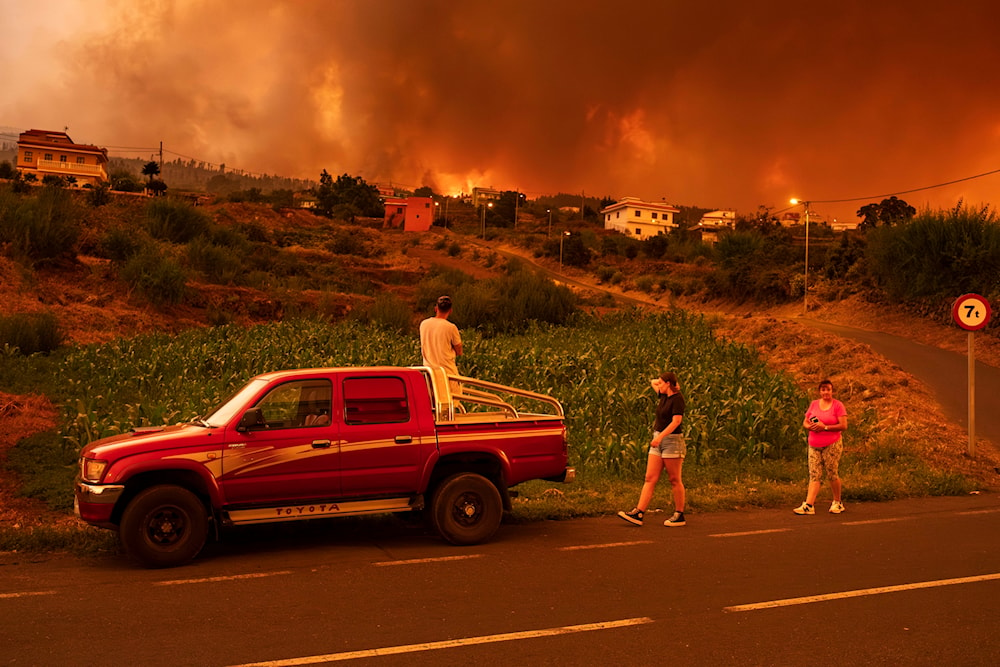Thousands of people to protest in Canary Islands against tourism model
For a week now, eleven members of the environmental groups have been on a hunger strike in protest against the construction of two large luxury developments in southern Tenerife.
-

Residents try to reach their houses in Benijos village as a wildfire advances in La Orotava in Tenerife, Canary Islands, Spain, August 19, 2023. (AP)
Thousands of people are set to join protests across the Canary Islands today, urging for an immediate reconsideration of its tourism industry and a freeze on tourist numbers as they said that the current decades-old model has rendered life unaffordable and environmentally unstable for locals.
Some of the environmental groups supporting the protests under the title "Canarias tiene un límite" (The Canaries have a limit) are Greenpeace, WWF (World Wildlife Fund), Ecologists in Action, Friends of the Earth, and SEO/Birdlife.
Resources and welfare
A spokesperson for the Canarias se Agota (The Canaries Have Had Enough) collective Víctor Martín, which is coordinating today's protests across the eight islands said, "We’ve reached the point where the balance between the use of resources and the welfare of the population here has broken down – especially over the past year."
The Canary Islands, which have a population of 2.2 million, hosted 13.9 million visitors last year. Its locals say that the tourism industry is depleting natural resources and increasingly pricing them out of the market. Tourism accounts for about 35% of the Islands' GDP, as in 2022 it brought in €16.9 billion.
In these Islands, 33.8% of people might be looking at poverty or social exclusion, which is the highest proportion for any region except Andalucía, according to data from Spain’s National Statistics Institute.
Stop the two mega-projects
For a week now, eleven members of the collective have been on a hunger strike in protest against the construction of two large luxury developments in southern Tenerife as they said it is "illegal" and totally unnecessary.
To clarify the objective of the protests, Martín, who mentioned that many people in the Islands have ties to generations of families from other countries like the UK and Germany, stressed that they are not against tourists, "The problem isn’t the tourists. It’s a model that was built around – and with the connivance of – a business class that doesn’t want to listen to what needs to be done, and with a political class that serves that business class instead of serving all the citizens."
"What we’re asking is very simple: given that tourism is the main economic activity and the cause of all these problems, we want an immediate halt to these two mega-projects,” he added, highlighting the urgency of the situation and addressing the developments.
"We also want a tourist moratorium that will lead to a study of the load each island can take, and which will determine whether we’ve already passed the critical point. In areas where there’s an overload, we want to see a stage of degrowth of economic activity to benefit natural resources. Otherwise, you have an existing model that only benefits a very few people," the spokesperson added.
Tourism over climate
To highlight how the regional government’s perpetual focus on tourism as the climate emergency causes cuts to water supplies does not make sense to him, Martín said, "Demand [for water] is rising in urban areas where there are more tourists," adding "We’ve had a very dry winter and a water emergency’s already been declared in Tenerife."
"There are going to be restrictions if there’s not more rain this month but it’s 36C here right now. This is all unsustainable and it means that we won’t even be able to keep normal levels of tourism going. And yet the authorities and the businesses here are trying to stick with this model," he stressed.
High prices, low wages, lack of public housing
Addressing the difficult housing situation in many areas across the Canary Islands due to high prices, low wages, lack of public housing, and the constant cost of living crisis, Martín said, "I realized we’d reached the limit when I saw people who were working as hotel maids or waiters were living in shacks."
"Wages are so low that they don’t cover the basic costs of living – especially in the current crisis, which is global, but has been felt keenly in the Canaries because we have to import practically everything," he emphasized.
According to Martín, a suitable study of the issues the Islands are facing could have a global impact "This rethinking of the tourism model could put the Canaries on the map as an example of sustainable tourism development."
"We could be known for something positive instead of something negative," he added.
The regional president of the Canary Islands, Fernando Clavijo, has told reporters this week that the government is already working on it "All the actions this government has taken have been based on a revision of this model," adding "The Canaries tourist model has been a successful one, but obviously, as with anything, there are things that could be perfected."

 5 Min Read
5 Min Read








